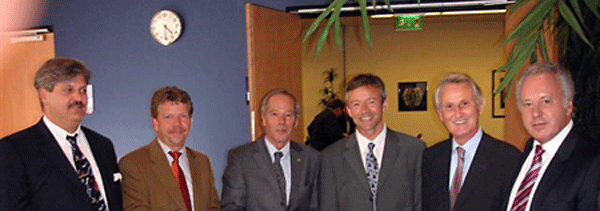Security
Tops German Club Agenda

Members
and guests welcome Prof. Dr. Manfred Schoelch (far right) as a new
regular colleague in the ACD during the happy hour around the September
session on Security. Pictured from right to left are Walter Melnyczuk,
Hugo Duchemin, Carlo Uebele, Thomas Waschke and Ralf Riksen. |
Air
Cargo Club Germany situate in Frankfurt since TWA and Pan Am served European
gateways with all-cargo B707s just completed its 42nd year in existence.
Traditionally the September meeting has always been something special.
We recall the meeting here four years ago
during this time was more like a dirge as the Club was gathering just
as the unthinkable happened on 9/11 /2001.
But this year on September 11th, tradition
and form got together and the board welcomed a lively group of members
and guests back to business after the traditional summer recess.
Headlining the agenda was a subject that
attracted key actors from all of the participating arts in the air cargo
transportation chain.
A deep-dish trip through new European and
German laws, regulations and rules pertaining to “Safety and Security
in Flying,” headlined the first meeting of the new ACD season.
Three experts from different German institutions
including a university professor delivered short speeches.
We regret to report that these well-intentioned
speeches sounded like they were being delivered from another planet with
little connection to what most air cargo people know is the daily operational
reality in warehouses and on tarmacs.
A new security law is to be implemented
here on December 1, 2005, but most people are unclear as to what the new
procedures will include, despite many papers on the subject.
What is known for certain is that old bits
and procedural pieces are integrated in the new rules.
For example the “known shipper”
mandates will continue mostly unchanged.
But many features of the new security regulation
will cost time and money and new labor in order to administrate.
Adding bureaucracy is a most revered and
long-held German tradition.
But to add on labor in an air cargo market
that sometimes delivers more revenue in fuel surcharges than base rates,
can be dangerous.
The ACD professional air cargo audience
of over 100 learned that an organization called TÜV-Nord operates
an academy and a respective competence team on “airfreight, courier-
and express services safety and security.”
Most people in Germany already knew that
the TÜV is an institution that was created once upon a time with
the mission of checking and inspecting technical equipment in Germany
to certify safety.
As example every automobile registered in
Germany must be inspected by “TÜV” every second year
as a requirement to be road-worthy.
TUV is not a government institution, but
TUV acts to enforce laws.
So now TÜV Nord Academy will be involved
in German air cargo to train people to become expert security representatives.
The trained people will then be permanent
fixtures at airlines, forwarders, integrators and regular shippers in
Germany.
The caveat is that a redundancy will have
to be created at every company in the form of a deputy – in case
the point security type has a cold, or is away on duty travel or vacation.
Again up pops a good example of the German
love for bureaucracy.
In a tight business climate, two for the
price of two when no one is quite sure what it is that one that most cannot
afford, will do, is about to be the new order of the day.
The second speaker is from Luftfahrt Bundesamt
(German equivalent of U.S. FAA).
The professor from the Berlin Technical
University tries to lead the ACD membership through a dense verbal jungle
of legislative mandates.
It is an immense challenge for air cargo
to cope with these new laws, but maybe even tougher to stay awake during
a well intentioned, albeit techno-legislative speech heavier than the
goulash.
Somebody says that there is no way that
the new rules are going to be in effect and followed in detail by December
1, 2005.
Many murmur agreement at that comment.
Somebody else notes that the respective
control manuals have not even been drafted yet.
There is a mild rippling of laughter about
the room.
An example of the challenge to tighten up
procedural security is brought forth in the form of talking about a single
consignment moving through the system.
In Germany there are17 international airports
handling cargo, express and mail.
More than 130 airlines sell and move airfreight
– mostly through 90 sales agents and a large number of handling
agents.
Some 250 IATA-agents with maybe 800 operational
locations are charged with delivering cargo “ready for carriage”
to their respective receiving point.
A high percentage of all shipments are loaded
and unloaded from trucks.
Someone wonders aloud how many hands are
touching this one random consignment before it is airborne?
So it is not without a bit of scepticism
that the working air cargo industry in Germany views officials creating
a paper trail to cover the legal aspects of security, while implementation
remains with drivers and warehouse agents and others.
Elsewhere ACD attendees this fine early
Autumn September afternoon are told that Boeing Aircraft confirmed earlier
for a presentation on October 11th may not show up because of a conflict
that is interpreted maybe as that nasty strike taking place at the manufacturer.
After the laborious security demonstration
a wait and see mood about future speakers and security became part of
the mosaic here.
November might offer a real highlight in
this year’s ACD agenda.
The quickly developing automotive spares,
components and accessories consignment business moving by air cargo, will
be discussed by Dominik Tickelkamp, managing director of the Volkswagen
AG in-house logistics company on November 8.
The ACD December meeting, by tradition,
belongs to the national carrier, Lufthansa Cargo.
General consensus is that everyone is looking
forward to hearing how the airline is managing to cope with the scissors
of exploding capacities and costs, and ever shrinking yields.
But back to September for a moment:
In the spirit of the best for last, Prof.
Dr. Manfred Schoelch, deputy chairman of the board of Frankfurt airport
operator Fraport AG, stands up and asks the assemblage to consider him
for membership in the Aircargo Club Germany.
He has been a guest often, even a guest
speaker at times.
Dr. Schoelch states in his short address
that he has always been close to cargo—a fact visible throughout
the cargo facilities here.
ACD is tradition, humor, fellowship and
business.
A great club with a proud history and a
constant record of service, not unlike, we imagine other air-minded organizations
from JFK to Timbuktu.
It’s good to be back.
(Günter Mosler)

SWISS Jets Jetzer To Top Post

The new SWISS Board of Directors has elected Rolf Jetzer as its Chairman.
It also elected Walter Bosch to serve as Deputy Chairman.
Five news members of the new SWISS Board of Directors were elected - each
for an ordinary term of office of three years including the aforementioned
and Jacques Aigrain, Wolfgang Mayrhuber and Klaus G. Schlede.
"Achieving sustainable profitability and integrating SWISS into the
Lufthansa Group will be the prime focuses of our new Board's activities,"
said Rolf Jetzer
Kuehne + Nagel opened
a new logistics center at Vantaa International
Airport in Helsinki,
Finland. The multifunctional facility offers 6,000 pallet positions and
7,000 square meters of warehouse space that can be expanded by an additional
6,000 square meters later said Markus Nyman,
CEO of OY Kuehne + Nagel Ltd. “In addition to our traditional forwarding
business, the new logistics centre in Vantaa enables us to provide warehousing
and distribution services, thereby increasing added value for our customers.”
FedEx Profits Despite Soaring
Fuel, Katrina
FedEx Corp. net income
for the fiscal first quarter ended Aug. 31 rose 3% to $339 million from
$330 million on a 10% increase in revenue to $7.71 billion despite a 51%
jump in fuel expense. "Results in the quarter were solid but earnings
were negatively impacted by an accounting charge," said Executive
VP and CFO Alan Graf Jr.,
adding that "Hurricane Katrina had no significant effect on first-quarter
results," although some FedEx facilities in the region were damaged.
|



